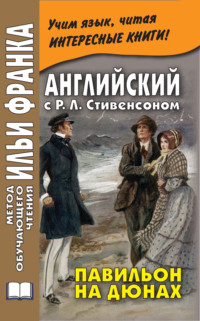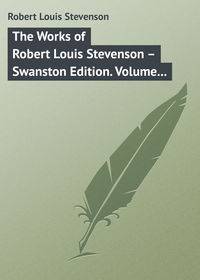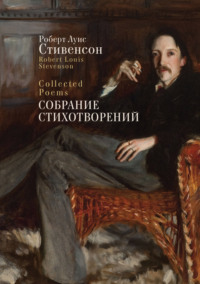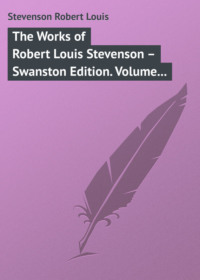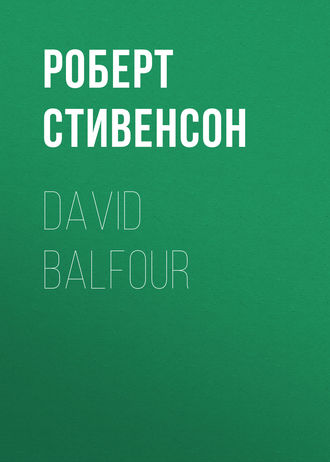 полная версия
полная версияDavid Balfour
"Ye'll find your work cut out for ye to establish that," quoth she.
"I perceive you know my uncle," said I; "and I daresay you may be the better pleased to hear that business is arranged."
"And what brings ye here after Miss Drummond?" she pursued.
"I'm come after my saxpence, mem," said I. "It's to be thought, being my uncle's nephew, I would be found a careful lad."
"So ye have a spark of sleeness in ye," observed the old lady, with some approval. "I thought ye had just been a cuif-you and your saxpence, and your lucky day and your sake of Balwhidder" – from which I was gratified to learn that Catriona had not forgotten some of our talk. "But all this is by the purpose," she resumed. "Am I to understand that ye come here keeping company?"
"This is surely rather an early question," said I. "The maid is young, so am I, worse fortune. I have but seen her the once. I'll not deny," I added, making up my mind to try her with some frankness, "I'll not deny but she has run in my head a good deal since I met in with her. That is one thing; but it would be quite another, and I think I would look very like a fool, to commit myself."
"You can speak out of your mouth, I see," said the old lady. "Praise God, and so can I! I was fool enough to take charge of this rogue's daughter: a fine charge I have gotten; but it's mine, and I'll carry it the way I want to. Do ye mean to tell me, Mr. Balfour of Shaws, that you would marry James More's daughter, and him hanged? Well, then, where there's no possible marriage there shall be no manner of carryings on, and take that for said. Lasses are bruckle things," she added, with a nod; "and though ye would never think it by my wrunkled chafts, I was a lassie mysel', and a bonny one."
"Lady Allardyce," said I, "for that I suppose to be your name, you seem to do the two sides of the talking, which is a very poor manner to come to an agreement. You give me rather a home thrust when you ask if I would marry, at the gallows' foot, a young lady whom I have seen but the once. I have told you already I would never be so untenty as to commit myself. And yet I'll go some way with you. If I continue to like the lass as well as I have reason to expect, it will be something more than her father, or the gallows either, that keeps the two of us apart. As for my family, I found it by the wayside like a lost bawbee! I owe less than nothing to my uncle; and if ever I marry, it will be to please one person: that's myself."
"I have heard this kind of talk before ye were born," said Mrs. Ogilvy, "which is perhaps the reason that I think of it so little. There's much to be considered. This James More is a kinsman of mine, to my shame be it spoken. But the better the family, the mair men hanged or heided, that's always been poor Scotland's story. And if it was just the hanging! For my part, I think I would be best pleased with James upon the gallows, which would be at least an end to him. Catrine's a good lass enough, and a good-hearted, and lets herself be deaved all day with a runt of an auld wife like me. But, ye see, there's the weak bit. She's daft about that long, false, fleeching beggar of a father of hers, and red-mad about the Gregara, and proscribed names, and King James, and a wheen blethers. And you might think ye could guide her, ye would find yourself sore mista'en. Ye say ye've seen her but the once…"
"Spoke with her but the once, I should have said," I interrupted. "I saw her again this morning from a window at Prestongrange's."
This I daresay I put in because it sounded well; but I was properly paid for my ostentation on the return.
"What's this of it?" cries the old lady, with a sudden pucker of her face. "I think it was at the Advocate's door-cheek that ye met her first."
I told her that was so.
"H'm," she said; and then suddenly, upon rather a scolding tone, "I have your bare word for it," she cries, "as to who and what you are. By your way of it, you're Balfour of the Shaws; but for what I ken you may be Balfour of the Deevil's oxter. It's possible ye may come here for what ye say, and it's equally possible ye may come here for deil care what! I'm good enough whig to sit quiet, and to have keepit all my men-folk's heads upon their shoulders. But I'm not just a good enough whig to be made a fool of neither. And I tell you fairly, there's too much Advocate's door and Advocate's window here for a man that comes taigling after a Macgregor's daughter. Ye can tell that to the Advocate that sent ye, with my fond love. And I kiss my loof to ye, Mr. Balfour," says she, suiting the action to the word, "and a braw journey to ye back to where ye cam frae."
"If you think me a spy," I broke out, and speech stuck in my throat. I stood and looked murder at the old lady for a space, then bowed and turned away.
"Here! Hoots! The callant's in a creel!" she cried. "Think ye a spy? what else would I think ye-me that kens naething by ye? But I see that I was wrong; and as I cannot fight, I'll have to apologise. A bonny figure I would be with a broadsword. Ay! ay!" she went on, "you're none such a bad lad in your way; I think ye'll have some redeeming vices. But, oh, Davit Balfour, ye're damned countryfeed. Ye'll have to win over that, lad; ye'll have to soople your back-bone, and think a wee pickle less of your dainty self; and ye'll have to try to find out that women-folk are nae grenadiers. But that can never be. To your last day you'll ken no more of women-folk than what I do of sow-gelding."
I had never been used with such expressions from a lady's tongue, the only two ladies I had known, Mrs. Campbell and my mother, being most devout and most particular women; and I suppose my amazement must have been depicted in my countenance, for Mrs. Ogilvy burst forth suddenly in a fit of laughter.
"Keep me!" she cried, struggling with her mirth, "you have the finest timber face-and you to marry the daughter of a Hieland cateran! Davie, my dear, I think we'll have to make a match of it-if it was just to see the weans. And now," she went on, "there's no manner of service in your daidling here, for the young woman is from home, and it's my fear that the old woman is no suitable companion for your father's son. Forbye that I have nobody but myself to look after my reputation, and have been long enough alone with a sedooctive youth. And come back another day for your saxpence!" she cried after me as I left.
My skirmish with this disconcerting lady gave my thoughts a boldness they had otherwise wanted. For two days the image of Catriona had mixed in all my meditations; she made their background, so that I scarce enjoyed my own company without a glint of her in a corner of my mind. But now she came immediately near; I seemed to touch her, whom I had never touched but the once; I let myself flow out to her in a happy weakness, and looking all about, and before and behind, saw the world like an undesirable desert, where men go as soldiers on a march, following their duty with what constancy they have, and Catriona alone there to offer me some pleasure of my days; I wondered at myself that I could dwell on such considerations in that time of my peril and disgrace; and when I remembered my youth I was ashamed. I had my studies to complete; I had to be called into some useful business; I had yet to take my part of service in a place where all must serve; I had yet to learn, and know, and prove myself a man; and I had so much sense as blush that I should be already tempted with these further-on and holier delights and duties. My education spoke home to me sharply; I was never brought up on sugar biscuits, but on the hard food of the truth. I knew that he was quite unfit to be a husband who was not prepared to be a father also; and for a boy like me to play the father was a mere derision.
When I was in the midst of these thoughts and about half-way back to town I saw a figure coming to meet me, and the trouble of my heart was heightened. It seemed I had everything in the world to say to her, but nothing to say first; and remembering how tongue-tied I had been that morning at the Advocate's, I made sure that I would find myself struck dumb. But when she came up my fears fled away; not even the consciousness of what I had been privately thinking disconcerted me the least; and I found I could talk with her as easily and rationally as I might with Alan.
"O!" she cried, "you have been seeking your sixpence: did you get it?"
I told her no; but now I had met with her my walk was not in vain. "Though I have seen you to-day already," said I, and told her where and when.
"I did not see you," she said. "My eyes are big, but there are better than mine at seeing far. Only I heard singing in the house."
"That was Miss Grant," said I, "the eldest and the bonniest."
"They say they are all beautiful," said she.
"They think the same of you, Miss Drummond," I replied, "and were all crowding to the window to observe you."
"It is a pity about my being so blind," said she, "or I might have seen them too. And you were in the house? You must have been having the fine time with the fine music and the pretty ladies."
"There is just where you are wrong," said I; "for I was as uncouth as a sea-fish upon the brae of a mountain. The truth is that I am better fitted to go about with rudas men than pretty ladies."
"Well, I would think so too, at all events!" said she, at which we both of us laughed.
"It is a strange thing, now," said I. "I am not the least afraid with you, yet I could have run from the Miss Grants. And I was afraid of your cousin too."
"O, I think any man will be afraid of her," she cried. "My father is afraid of her himself."
The name of her father brought me to a stop. I looked at her as she walked by my side; I recalled the man, and the little I knew and the much I guessed of him; and comparing the one with the other, felt like a traitor to be silent.
"Speaking of which," said I, "I met your father no later than this morning."
"Did you?" she cried, with a voice of joy that seemed to mock at me. "You saw James More? You will have spoken with him, then?"
"I did even that," said I.
Then I think things went the worst way for me that was humanly possible. She gave me a look of mere gratitude. "Ah, thank you for that!" says she.
"You thank me for very little," said I, and then stopped. But it seemed when I was holding back so much, something at least had to come out. "I spoke rather ill to him," said I; "I did not like him very much; I spoke him rather ill, and he was angry."
"I think you had little to do then, and less to tell it to his daughter!" she cried out. "But those that do not love and cherish him I will not know."
"I will take the freedom of a word yet," said I, beginning to tremble. "Perhaps neither your father nor I are in the best of good spirits at Prestongrange's. I daresay we both have anxious business there, for it's a dangerous house. I was sorry for him too, and spoke to him the first, if I could but have spoken the wiser. And for one thing, in my opinion, you will soon find that his affairs are mending."
"It will not be through your friendship, I am thinking," said she; "and he is much made up to you for your sorrow."
"Miss Drummond," cried I, "I am alone in this world…"
"And I am not wondering at that," said she.
"O, let me speak!" said I. "I will speak but the once, and then leave you, if you will, for ever. I came this day in the hopes of a kind word that I am sore in want of. I know that what I said must hurt you, and I knew it then. It would have been easy to have spoken smooth, easy to lie to you; can you not think how I was tempted to the same? Cannot you see the truth of my heart shine out?"
"I think here is a great deal of work, Mr. Balfour," said she. "I think we will have met but the once, and will can part like gentle-folk."
"O, let me have one to believe in me!" I pleaded, "I cannae bear it else. The whole world is clanned against me. How am I to go through with my dreadful fate? If there's to be none to believe in me I cannot do it. The man must just die, for I cannot do it."
She had still looked straight in front of her, head in air; but at my words or the tone of my voice she came to a stop. "What is this you say?" she asked. "What are you talking of?"
"It is my testimony which may save an innocent life," said I, "and they will not suffer me to bear it. What would you do yourself? You know what this is, whose father lies in danger. Would you desert the poor soul? They have tried all ways with me. They have sought to bribe me; they offered me hills and valleys. And to-day that sleuth-hound told me how I stood, and to what a length he would go to butcher and disgrace me. I am to be brought in a party to the murder; I am to have held Glenure in talk for money and old clothes; I am to be killed and shamed. If this is the way I am to fall, and me scarce a man-if this is the story to be told of me in all Scotland-if you are to believe it too, and my name is to be nothing but a by-word-Catriona, how can I go through with it? The thing's not possible; it's more than a man has in his heart."
I poured my words out in a whirl, one upon the other; and when I stopped I found her gazing on me with a startled face.
"Glenure! It is the Appin murder," she said softly, but with a very deep surprise.
I had turned back to bear her company, and we were now come near the head of the brae above Dean village. At this word I stepped in front of her like one suddenly distracted.
"For God's sake!" I cried, "for God's sake, what is this that I have done?" and carried my fists to my temples. "What made me do it? Sure, I am bewitched to say these things!"
"In the name of heaven, what ails you now?" she cried.
"I gave my honour," I groaned, "I gave my honour and now I have broke it. O, Catriona!"
"I am asking you what it is," she said; "was it these things you should not have spoken? And do you think I have no honour, then? or that I am one that would betray a friend? I hold up my right hand to you and swear."
"O, I knew you would be true!" said I. "It's me-it's here. I that stood but this morning and out-faced them, that risked rather to die disgraced upon the gallows than do wrong-and a few hours after I throw my honour away by the roadside in common talk! 'There is one thing clear upon our interview,' says he, 'that I can rely on your pledged word.' Where is my word now? Who could believe me now? You could not believe me. I am clean fallen down; I had best die!" All this I said with a weeping voice, but I had no tears in my body.
"My heart is sore for you," said she, "but be sure you are too nice. I would not believe you, do you say? I would trust you with anything. And these men? I would not be thinking of them! Men who go about to entrap and to destroy you! Fy! this is no time to crouch. Look up! Do you not think I will be admiring you like a great hero of the good-and you a boy not much older than myself? And because you said a word too much in a friend's ear, that would die ere she betrayed you-to make such a matter! It is one thing that we must both forget."
"Catriona," said I, looking at her, hang-dog, "is this true of it? Would ye trust me yet?"
"Will you not believe the tears upon my face?" she cried. "It is the world I am thinking of you, Mr. David Balfour. Let them hang you; I will never forget, I will grow old and still remember you. I think it is great to die so; I will envy you that gallows."
"And maybe all this while I am but a child frighted with bogles," said I. "Maybe they but make a mock of me."
"It is what I must know," she said. "I must hear the whole. The harm is done at all events, and I must hear the whole."
I had sat down on the wayside, where she took a place beside me, and I told her all that matter much as I have written it, my thoughts about her father's dealing being alone omitted.
"Well," she said, when I had finished, "you are a hero, surely, and I never would have thought that same! And I think you are in peril, too. O, Symon Fraser! to think upon that man! For his life and the dirty money, to be dealing in such traffic!" And just then she called out aloud with a queer word that was common with her, and belongs, I believe, to her own language. "My torture!" says she, "look at the sun!"
Indeed, it was already dipping towards the mountains.
She bid me come again soon, gave me her hand, and left me in a turmoil of glad spirits. I delayed to go home to my lodging, for I had a terror of immediate arrest; but got some supper at a change house, and the better part of that night walked by myself in the barley-fields, and had such a sense of Catriona's presence that I seemed to bear her in my arms.
CHAPTER VIII
THE BRAVO
The next day, August 29th, I kept my appointment at the Advocate's in a coat that I had made to my own measure, and was but newly ready.
"Aha," says Prestongrange, "you are very fine to-day; my misses are to have a fine cavalier. Come, I take that kind of you. I take that kind of you, Mr. David. O, we shall do very well yet, and I believe your troubles are nearly at an end."
"You have news for me?" cried I.
"Beyond anticipation," he replied. "Your testimony is after all to be received; and you may go, if you will, in my company to the trial, which is to be held at Inverary, Thursday, 21st proximo."
I was too much amazed to find words.
"In the meanwhile," he continued, "though I will not ask you to renew your pledge, I must caution you strictly to be reticent. To-morrow your precognition must be taken; and outside of that, do you know, I think least said will be soonest mended."
"I shall try to go discreetly," said I. "I believe it is yourself that I must thank for this crowning mercy, and I do thank you gratefully. After yesterday, my lord, this is like the doors of Heaven. I cannot find it in my heart to get the thing believed."
"Ah, but you must try and manage, you must try and manage to believe it," says he, soothing-like, "and I am very glad to hear your acknowledgment of obligation, for I think you may be able to repay me very shortly" – he coughed-"or even now. The matter is much changed. Your testimony, which I shall not trouble you for to-day, will doubtless alter the complexion of the case for all concerned, and this makes it less delicate for me to enter with you on a side issue."
"My lord," I interrupted, "excuse me for interrupting you, but how has this been brought about? The obstacles you told me of on Saturday appeared even to me to be quite insurmountable; how has it been contrived?"
"My dear Mr. David," said he, "it would never do for me to divulge (even to you, as you say) the councils of the Government; and you must content yourself, if you please, with the gross fact."
He smiled upon me like a father as he spoke, playing the while with a new pen; methought it was impossible there could be any shadow of deception in the man: yet when he drew to him a sheet of paper, dipped his pen among the ink, and began again to address me, I was somehow not so certain, and fell instinctively into an attitude of guard.
"There is a point I wish to touch upon," he began. "I purposely left it before upon one side, which need be now no longer necessary. This is not, of course, a part of your examination, which is to follow by another hand; this is a private interest of my own. You say you encountered Breck upon the hill?"
"I did, my lord," said I.
"This was immediately after the murder?"
"It was."
"Did you speak to him?"
"I did."
"You had known him before, I think?" says my lord, carelessly.
"I cannot guess your reason for so thinking, my lord," I replied, "but such is the fact."
"And when did you part with him again?" said he.
"I reserve my answer," said I. "The question will be put to me at the assize."
"Mr. Balfour," said he, "will you not understand that all this is without prejudice to yourself? I have promised you life and honour; and, believe me, I can keep my word. You are therefore clear of all anxiety. Alan, it appears, you suppose you can protect; and you talk to me of your gratitude, which I think (if you push me) is not ill-deserved. There are a great many different considerations all pointing the same way; and I will never be persuaded that you could not help us (if you chose) to put salt on Alan's tail."
"My lord," said I, "I give you my word I do not so much as guess where Alan is."
He paused a breath. "Nor how he might be found?" he asked.
I sat before him like a log of wood.
"And so much for your gratitude, Mr. David!" he observed. Again there was a piece of silence. "Well," said he, rising, "I am not fortunate, and we are a couple at cross purposes. Let us speak of it no more; you will receive notice when, where, and by whom we are to take your precognition. And in the meantime, my misses must be waiting you. They will never forgive me if I detain their cavalier."
Into the hands of these graces I was accordingly offered up, and found them dressed beyond what I had thought possible, and looking fair as a posy.
As we went forth from the doors a small circumstance occurred which came afterwards to look extremely big. I heard a whistle sound loud and brief like a signal, and looking all about, spied for one moment the red head of Neil of the Tom, the son of Duncan. The next moment he was gone again, nor could I see so much as the skirt-tail of Catriona, upon whom I naturally supposed him to be then attending.
My three keepers led me out by Bristo and the Bruntsfield Links; whence a path carried us to Hope Park, a beautiful pleasance, laid with gravel-walks, furnished with seats and summer-sheds, and warded by a keeper.
The way there was a little longsome; the two younger misses affected an air of genteel weariness that damped me cruelly, the eldest considered me with something that at times appeared like mirth; and though I thought I did myself more justice than the day before, it was not without some effort. Upon our reaching the park I was launched on a bevy of eight or ten young gentlemen (some of them cockaded officers, the rest chiefly advocates) who crowded to attend upon these beauties; and though I was presented to all of them in very good words, it seemed I was by all immediately forgotten. Young folk in a company are like to savage animals: they fall upon or scorn a stranger without civility, or I may say, humanity; and I am sure, if I had been among baboons, they would have shown me quite as much of both. Some of the advocates set up to be wits, and some of the soldiers to be rattles; and I could not tell which of these extremes annoyed me most. All had a manner of handling their swords and coat-skirts, for the which (in mere black envy) I could have kicked them from that park. I daresay, upon their side, they grudged me extremely the fine company in which I had arrived; and altogether I had soon fallen behind, and stepped stiffly in the rear of all that merriment with my own thoughts.
From these I was recalled by one of the officers, Lieutenant Hector Duncansby, a gawky, leering, Highland boy, asking if my name was not "Palfour."
I told him it was, not very kindly, for his manner was scant civil.
"Ha, Palfour," says he, and then, repeating it, "Palfour, Palfour!"
"I am afraid you do not like my name, sir," says I, annoyed with myself to be annoyed with such a rustical fellow.
"No," says he, "but I wass thinking."
"I would not advise you to make a practice of that, sir," says I. "I feel sure you would not find it to agree with you."
"Tit you effer hear where Alan Grigor fand the tangs?" said he.
I asked him what he could possibly mean, and he answered, with a heckling laugh, that he thought I must have found the poker in the same place and swallowed it.
There could be no mistake about this, and my cheek burned.
"Before I went about to put affronts on gentlemen," said I, "I think I would learn the English language first."
He took me by the sleeve with a nod and a wink, and led me quietly outside Hope Park. But no sooner were we beyond the view of the promenaders, than the fashion of his countenance changed. "You tam lowland scoon'rel!" cries he, and hit me a buffet on the jaw with his closed fist.
I paid him as good or better on the return; whereupon he stepped a little back and took off his hat to me decorously.


